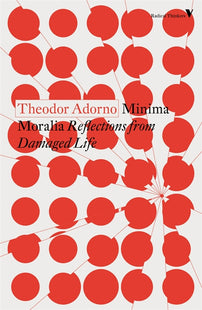All the little flowers by Theodor Adorno
The most blissful memory of a person can be revoked in its very substance by later experience. He who has loved and who betrays love does harm not only to the image of the past, but to the past itself.

Our new set of Radical Thinkers have just been released and to celebrate the new edition of Theodor Adorno's Minima Moralia: Reflections from Damaged Life we're publishing an excerpt from this beloved collection every day.
All the little flowers 1 - The pronouncement, probably by Jean Paul, that memories are the only possessions which no-one can take from us, belongs in the storehouse of impotently sentimental consolations that the subject, resignedly withdrawing into inwardness, would like to believe the very fulfilment that he has given up. In setting up his own archives, the subject seizes his own stock of experience as property, so making it something wholly external to himself. Past inner life is turned into furniture just as, conversely, every Biedermeier piece was memory made wood. The interior where the soul accommodates its collection of memoirs and curios is derelict. Memories cannot be conserved in drawers and pigeon-holes; in them the past is indissolubly woven into the present. No-one has them at his disposal in the free and voluntary way that is praised in Jean Paul's fulsome sentences. Precisely where they become controllable and objectified, where the subject believes himself entirely sure of them, memories fade like delicate wallpapers in bright sunlight. But where, protected by oblivion, they keep their strength, they are endangered like all that is alive. This is why Bergson's and Proust's conception, intended to combat reification, that the present, immediacy, is constituted only through the mediation of memory, has not only a redeeming but an infernal aspect. Just as no earlier experience is real that has not been loosed by involuntary remembrance from the deathly fixity of its isolated existence, so conversely, no memory is guaranteed, existent in itself, indifferent to the future of him who harbours it; nothing past is proof, through its translation into mere imagination, against the curse of the empirical present. The most blissful memory of a person can be revoked in its very substance by later experience. He who has loved and who betrays love does harm not only to the image of the past, but to the past itself. Irresistibly evident, an impatient movement while waking up, a distraught tone of voice, a faint hypocrisy in pleasure, obtrudes itself in the memory and turns the earlier closeness even then into the distance that it has since become. Despair has the accent of irrevocability not because things cannot improve, but because it draws the past too into its vortex. Therefore it is foolish and sentimental to try to keep the past untainted by the present's turbid flood. No other hope is left to the past than that, exposed defencelessly to disaster, it shall emerge from it as something different. But he who dies in despair has lived his whole life in vain.
1. Allusion to line from Schubert's song Troclcne Blumen (1823) from the cycle Die Schone A-fullerin, which starts: hr Blumlein alle, die sie mir gah (All the little flowers that she gave me). The theme of the song is the fading of the flowers and the sentiment avowed by them.
